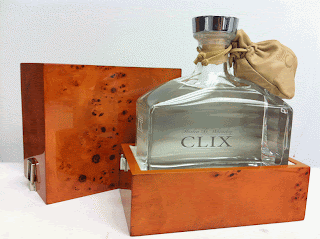The other day, I was reading my foodie news online before I took a shower, and I did something I never do. I clicked on one of the ads.
It was for CLIX Vodka. Then, I looked down and saw the price: $299.99. Harlan D Wheatley CLIX Vodka sells exclusively on the Pennsylvania Liquor Board's wine and spirits website. $300 Vodka; really? Whoa. It comes in this handsome crafted burl wood travel box and (of course) a crystal decanter. Let's face it, if you're gonna drop three bills on a bottle of vodka, it should be travel-ready, right?
CLIX does not rhyme with *sticks*, it's actually Roman numerals for 159, or how many times this vodka has been distilled. Double whoa.
...Master Distiller Harlen Wheatley didn't stop until he reached 159 distillations when he created his namesake vodka, HDW CLIX. Named for Harlen Davis Wheatley and the Roman numerals denoting the number of times it was distilled, (159), the HDW CLIX project idea started ten years ago at Buffalo Trace Distillery.
The vodka is made from red winter wheat, rye, yellow dent distiller’s grade corn and distiller’s malted barley, combined with limestone-rich water. The process includes cooking, fermenting and distilling from an original 28,400 gallons of mash, dividing it down and re-distilling over a period of twelve months, resulting in 159 distillations, 332 gallons and 2,000 bottles of vodka. Before the final bottling, the product was rested in a stainless steel tank for 12 months.
This is the still where CLIX is made. This is straight-up Willy Wonka shit right here. Impressive.
Most vodka drinkers enjoy a smooth vodka with no harsh aftertaste. And, obviously the more you distill something, the smoother it gets. Let's be clear, distillation removes impurities. Clarified butter is butter removed of its impurities, too; fat solids that, in some people's opinion, equate to flavor. Yes, you can cook longer and at higher temperatures with clarified butter, but brown butter is one of cooking's greatest hidden pleasures. Baking, for example, with brown butter that resolidifies is sublime. Deep, nutty flavors emerge from heating the butter and cooking those impurities, not OUT of the butter, but IN the butter.
Vodka when distilled, depending on your ingredients, will give you a clean flavor, too, but doesn't it stand to reason the more you distill the spirit, the more neutral it will become? Does neutrality of flavor equal quality?
This is what they say,
"...In creating HDW CLIX, we strove to capture the essence of perfect vodka - smooth; subtle; soft; elegant; structured; clean on the nose and palate. Extensive organoleptic testing and sophisticated chromatography confirm the results - we achieved the perfect vodka."
Organoleptic testing and sophisticated chromatography? Okay- sounds like very few people would (or can) argue with that, especially since it's confirmed. Now what the hell does it mean?!
So full disclosure, here: I'm not a huge fan of vodka. In general, I think a lot of vodka is insipid. I enjoy Kettle One, but only by itself. Vodka and any mixer is just a way to get effed up without the calories of beer and wine, and is less likely than scotch to get you a road test if pulled over. Flavored vodka? It is proof that the Devil exists and he wants your young adult children.
What does it taste like, I wonder? I've found it very difficult to find any sort of product review, other than the shelf-talkers on every website that has the same photos I have posted. I presume it should be kept in the freezer and never touch ice. If you're going to go that far, why taint it with merely once-distilled tap water? You should probably choose a glass that will complement whatever bouquet (essence de rien) it may yield. And, it goes without saying, this is sipping vodka.
Sigh. I dunno. I'm trying to imagine if I'm really missing anything, and I can't.



No comments:
Post a Comment